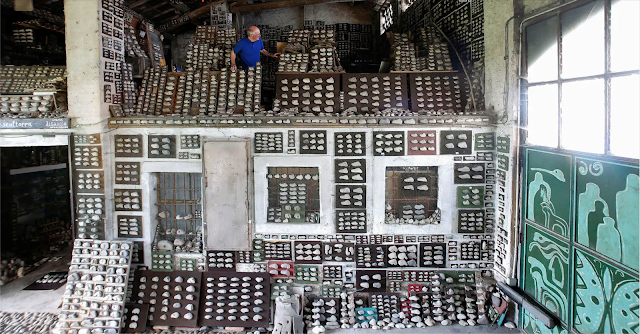Prompt 1
On page 136 Stewart writes, “The souvenir is
by definition always incomplete. The object is metonymic to the scene of its
original appropriation in the sense that it is a sample.” I also appreciate
that the souvenir is not necessarily a homomaterial replica; it can be a
representation in another medium. This makes me think about how literal this
replica must be to maintain its function as souvenir, or how much of the (whole)
must exist. It also links back to the Mike Kelley reading Playing With Dead
Things where he talks about redundancy in sculpture, and sculpture as
uncolored. If I remember correctly it was this reading that discusses the
function of art that purely replicates objects based on their exactitude of
color and form.
This made me think about Robert Dawson’s
ceramic work. He plays with the idea of the traditional souvenir or collection
with an unconventional perspective. Some of his pieces are prints on china that
challenge the inherent delicacy and untouchability of those objects.
 |
| Robert Dawson _ In Perspective Willow 1 |
 |
| Robert Dawson _ Spin |
 |
| Robert Dawson _ Spin |
Prompt 2
On page 159 Stewart goes on to say, “The
finite boundaries these objects afford are played against the infinite
possibility of their collection, and, analogously, their finite use value when
filled is played against their measureless emptiness that marks their new
aesthetic function”. This makes me think about earlier chapters in On Longing
where Stewart discusses the importance of understanding something through its
absence. Page 27, “We might emphasize the importance of a given moment by its
absence, by the study of its surroundings, thus making the reader feel that
there is a lacuna in the fabric of what is being narrated, or something that is
being hidden”. For one I think Stewart is communicating that to better
conceptualize ideas of infinity we need to measure something against the actual
or the finite. This duality of the infinite to the finite is the collection
being measured against the inherent physical limitations of an object.
I came across a collection that really excited
me. A 79-year man in Italy has a giant rock collection, all collected from the
same river. What I totally love about this is how arbitrary and deeply personal
the collection is. There isn’t anything inherently valuable or culturally
significant about his collection yet he goes to extreme lengths to both acquire
and exhibit these objects. In this sense the infinite personal value these
rocks have for the collector impresses me most. I’d love to learn more about
the rhythm and reason behind choosing which rocks to take and how the method of
grouping them.





No comments:
Post a Comment